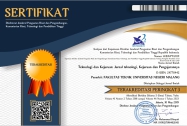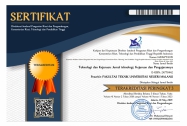Development of Intensive Apprenticeship Models for Accelerating Certification
Abstract
As a consequence of the rapid development of infrastructures, there is a scarcity of availability of skilled labor in construction services, so efforts are needed to accelerate the preparation of experts in the field of construction services. Intensive apprenticeship pattern is a program to accelerate the preparation of construction service workers in increasing the relevance of higher education to the world of work as a purpose in this study. Data analysis used comparative analysis and descriptive statistics. The results of the study show that the existing pattern of internship in the field carried out by the sample universities is that there are two things that have not been widely implemented, namely the provision of insurance and special facilities. While other items related to the implementation of internships have a percentage of more than 50 percent. The apprenticeship patterns that can be implemented include through the process of collaboration, socialization, participant registration, self assessment, matriculation, implementation of internships, appraisal, and granting certificates from the Construction Services Business Entity (CSBE/ BUJK). Whereas Certification is carried out in general through Pre-Internship, Internships, Judicium, Post-Judiciary, Graduation and Certification of Young Experts.
Keywords
Full Text:
PDFReferences
Dadan, D. (2017). Penerapan Model Pelatihan n The Job Training (Magang) dalam Pelatihan Otomotif yang di Selenggarakan oleh Balai Pelayanan Pendidikan Nonformal Provinsi Banten. Jurnal Eksistensi Pendidikan Luar Sekolah (E-Plus), 2(2), 116-213. Doi: http://dx.doi.org/10.30870/e-plus.v2i2.2957
Daly, S, R., Mosyjowski, E, A., & Seifert, C, M. (2014). Teaching Creativity in Engineering Courses. Journal of Engineering Education. 103(3), 417-449. Doi: https://doi.org/10. 1002/jee.20048.
Fadilah, A, A., & Fakhruddin, F. (2019). Manajemen Pembelajaran Pelatihan Persiapan Program Magang. Journal of Nonformal Education and Community Empowerment, 3(2), 148-159. Doi: https://doi.org/10.15294/pls.v3i2.33228
Ghoer, H, F., Ratnawulan, R., Mulyati, E, N., Suherman, D., & Wachyudin, W. (2019). Sekolah Mitra Sebagai Komunikator Pelaksanaan Magang Penguasaan Kompetensi Calon Pendidik pada Fakultas Keguruan dan Ilmu Pendidikan. Jurnal Kehumasan Universitas Pendidikan Indonesia. 2(1), 248-263.
Huntzinger, J. (2009). The Root of Lean, Training Within Industry: The Origin of Japanese Management and Kaizen. Boston: Lean Enterprise Institute, Inc.
Islahuddin, B, N., Wicaksono, S, A., & Purnomo, W. (2020). Pengembangan Sistem Informasi Magang untuk Membantu Proses Administrasi Siswa Magang (Studi pada: Badan Kepegawaian Negara). Jurnal Pengembangan Teknologi Informasi dan Ilmu Komputer, 4(5), 1480-1489.
Ismailia, T., & Muhtadi, A. (2015). Pengembangan Program Pelatihan Pra-Magang Mahasiswa Program Studi Bahasa Inggris Politeknik Negeri Jember. Jurnal Inovasi Teknologi Pendidikan, 2(2), 132-142. Doi: https://doi.org/10.21831/tp.v2i2.7603
Kompas. (2015). MEA, Antara Peluang dan Ancaman. (Online), (http://print.kompas.com/baca/2015 /12/01/MEA%2c-Antara-Peluang-dan-Ancaman), diakses 2 Juni 2016.
Muslih, M. (2014). Analisis Efektifitas Program Magang untuk Sinkronisasi Link and Match Perguruan Tinggi dengan Dunia Industri (Studi Terhadap Program Magang pada Fakultas Ekonomi Prodi Manajemen Universitas Muhammadiyah Sumaterra Utara). Jurnal Manajemen & Bisnis, 14(1). 64-76. Doi: http://dx.doi.org/10.30596%2Fjimb.v14i01.120
PERLEM LPJK. (2013). Persyaratan dan Tata Cara Pendaftaran Asosiasi Profesi dan Institusi Pendidikan dan Pelatihan yang Diberikan Kewenangan Verifikasi dan Validasi Awal Tenaga Kerja Konstruksi. Jakarta: Lembaga Pengembang Jasa Konstruksi Nasional.
Ralph, E., Walker, K & Wimmer, R. (2009). Praticum Education Experience: Post Intern` View. International Journal of Engineering Education. 25(1), 122-130.
Rijanto, T., Munoto, M., & Widyartono, M. (2020). Keterlaksanaan Program Revitalisasi SMK dalam Upaya Meningkatkan Kualitas Kelulusan di SMK. Jurnal Pendidikan Teknik Elektro, 09(03), 653-662.
Setyorini, D., Lestari, B., Purwanto, P., Winarno, W., Sagoro, E. M., Prasetya, R., & Chasanah, I. U. (2016). Model Magang Industri Guna Pencapaian Standar Kompetensi Lulusan Fakultas Ekonomi Universitas Negeri Yogyakarta. Jurnal Pendidikan Akuntansi Indonesia, XIV(2), 37-47. Doi: https://doi.org/10.21831/jpai.v14i2.12868
Susilawati, L. (2018). Penerapan Supervisi Multi Metode untuk Mengoptimalkan Guru SMKS Assalaam Mengimplementasikan Hasil Kegiatan Magang di DU/DI Kepada Guru Produktif Lainnya Melalui Learning Community. Jurnal Ilmiah Indonesia, 3(7), 79-88.
Walter, D., & Bevens, B. (2006). Learn by Doing: The Story with Training Wthin Industry. Summit: Walter Dietz.
Yustiana, M. (2020). Pembinaan untuk Mengoptimalkan Hasil Kegiatan Magang Guru Produktif SMK Negeri 3 Magelang Melalui Learning Communit. Syntax Idea, 2(1), 59-66. Doi: https://doi.org/10.36418/syntax-idea.v2i1.127
DOI: http://dx.doi.org/10.17977/um031v44i12021p21-27
Refbacks
- There are currently no refbacks.
Copyright (c) 2021 Teknologi dan Kejuruan: Jurnal Teknologi, Kejuruan, dan Pengajarannya
Teknologi dan Kejuruan: Jurnal Teknologi, Kejuruan, dan Pengajarannya
E-ISSN 2477-0442 (online)
Contact
Faculty of Engineering, Universitas Negeri Malang (UM)
Jl. Semarang No 5 Malang 65145, Building H5, 1st Floor.
Homepage: http://journal2.um.ac.id/index.php/teknologi-kejuruan
Email: teknologikejuruan.ft@um.ac.id

This work is licensed under a Creative Commons Attribution 4.0 International License.



2.png)
1.png)
1.png)
1.png)
4.png)
1.png)
.png)

3.png)
1.png)
1.png)


